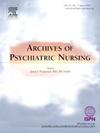The influence of trauma history on opiate use disorder in an urban treatment facility in Pennsylvania
IF 2.2
4区 医学
Q1 NURSING
引用次数: 0
Abstract
Background
Opioid use disorder is one of the most severe forms of substance use disorder and is associated with high morbidity and mortality. Opiate overdose deaths in the US are increasing every year, claiming over 100,000 lives in 2022. Psychological trauma exposure and post-traumatic stress disorder are major health problems in the United States and may contribute to the development of an opiate use disorder. The purpose of this study was to examine the association of psychological trauma exposure and post-traumatic stress disorder with opiate use disorder.
Methods
This study used a retrospective design with a convenience sample size of n = 150 participants diagnosed with opiate use disorder or substance use disorder from a drug treatment center in urban Pennsylvania. Retrospective data was collected on demographic characteristics, trauma exposures, diagnoses of post-traumatic stress disorder, opiate use disorder, and substance use disorder. Demographic data was gathered using a demographic survey, psychological trauma exposure was documented using the self-reported Life Events Checklist, and a diagnosis of post-traumatic stress disorder, opiate use disorder, and substance use disorder was confirmed as documented in the medical record by mental health providers.
Results
Persons with psychological trauma exposure >5 are more likely to develop opiate use disorder, Chi-Square (χ2 = 5.17, df = 1, p = 0.023).
Conclusion
Our study showed that psychological trauma exposure may lead to opiate use disorder, emphasizing the importance of identification of psychological trauma exposure and post-traumatic stress disorder diagnosis as part of trauma-informed strategies during the treatment of persons with opiate use disorder to help prevent disability and death.
宾夕法尼亚州一家城市治疗机构中创伤史对鸦片制剂使用障碍的影响
背景阿片类药物使用障碍是最严重的药物使用障碍之一,与高发病率和高死亡率相关。美国阿片类药物过量致死的人数逐年增加,到 2022 年将超过 10 万人。心理创伤和创伤后应激障碍是美国的主要健康问题,可能会导致鸦片剂使用障碍。本研究旨在探讨心理创伤暴露和创伤后应激障碍与鸦片制剂使用障碍之间的关联。本研究采用回顾性设计,样本容量为 150 人,均来自宾夕法尼亚州城市的一家戒毒治疗中心,均被诊断为鸦片制剂使用障碍或药物使用障碍。研究收集了有关人口统计学特征、创伤暴露、创伤后应激障碍诊断、鸦片制剂使用障碍和药物使用障碍的回顾性数据。人口统计学数据通过人口统计学调查收集,心理创伤暴露通过自我报告的生活事件检查表记录,创伤后应激障碍、鸦片制剂使用障碍和药物使用障碍的诊断通过心理健康提供者在医疗记录中的记录确认。结论我们的研究表明,心理创伤暴露可能会导致鸦片制剂使用障碍,这强调了在治疗鸦片制剂使用障碍患者期间,作为创伤知情策略的一部分,识别心理创伤暴露和创伤后应激障碍诊断的重要性,有助于预防残疾和死亡。
本文章由计算机程序翻译,如有差异,请以英文原文为准。
求助全文
约1分钟内获得全文
求助全文
来源期刊
CiteScore
3.70
自引率
0.00%
发文量
131
审稿时长
160 days
期刊介绍:
Archives of Psychiatric Nursing disseminates original, peer-reviewed research that is of interest to psychiatric and mental health care nurses. The field is considered in its broadest perspective, including theory, practice and research applications related to all ages, special populations, settings, and interdisciplinary collaborations in both the public and private sectors. Through critical study, expositions, and review of practice, Archives of Psychiatric Nursing is a medium for clinical scholarship to provide theoretical linkages among diverse areas of practice.

 求助内容:
求助内容: 应助结果提醒方式:
应助结果提醒方式:


